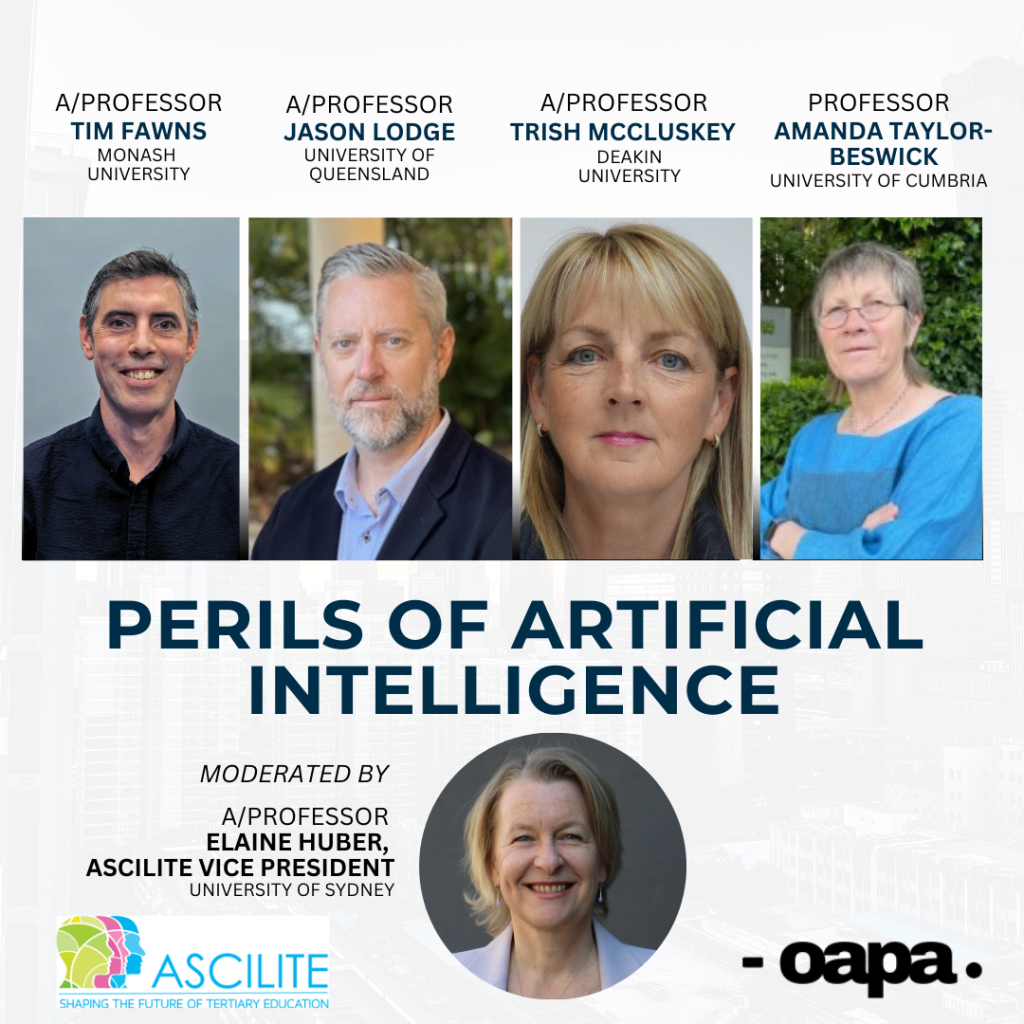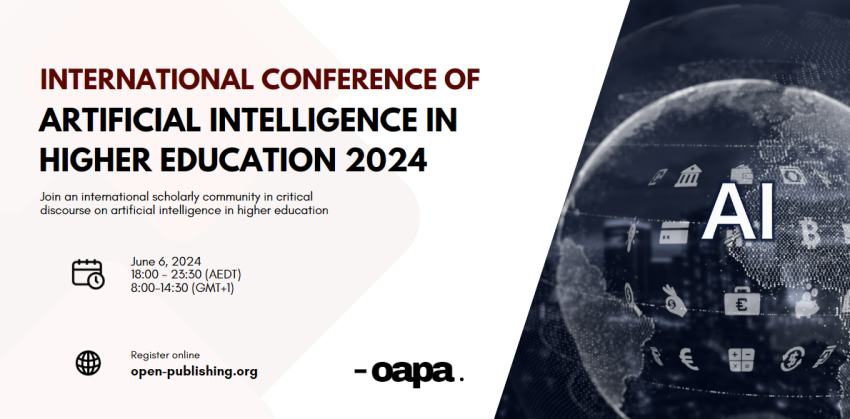INTERNATIONAL CONFERENCE OF ARTIFICIAL INTELLIGENCE IN HIGHER EDUCATION 2024
Join us for a rich series of keynotes, panels, presentations, and workshops on artificial intelligence in higher education following the successful publication of the Journal of University Teaching and Learning Practice Special Issue on “Enhancing Student Engagement using Artificial Intelligence (AI) and chatbots like ChatGPT”
The conference is held virtually on 6 June 2024. 5pm – 11.30pm (Australia, AEST): , and 8am-2.30pm (London, GMT+1).
ASCILITE Panel on the Perils of Artificial Intelligence

The Conference Panel hosted by Associate Professor Michael Cowling, President of the Australasian Society for Computers in Learning in Tertiary Education, and includes four distinguished panellists:
-
- Associate Professor Tim Fawns, Monash University, Australia.
- Associate Professor Jason Lodge, University of Queensland, Australia.
- Associate Professor Trish McCluskey, Deakin University, Australia.
- Professor Amanda Taylor-Beswick, University of Cumbria, England.
Keynote Address: Dr Eliseo Vilalta-Perdomo
In this keynote, we will propose “thing ethnography” as an alternative approach for Generative AI (GenAI) tools to articulate their self-perceptions. ‘Thing ethnography’ will help us gain insights into GenAI’s perspectives on the challenges and opportunities they pose for higher education. We will present two examples of a GenAI tool portraying itself in various roles. The first case involves an interview aimed at understanding its viewpoints on conceptual clarification, GenAI integration, and practical application. The second case study discusses its use in experiential learning for authentic assessment in higher education. The keynote will conclude by underscoring the significance of ‘thing ethnography’ as a novel approach for interacting with AI systems. It will also advocate for further research to discover optimal practices and strategies for harnessing GenAI tools in educational settings.
Dr Eliseo Vilalta-Perdomo is a Senior Teaching Fellow at the Operations and Information Management Department, Aston Business School, Aston University, UK. His current research is at the intersection of human performance, technology and sustainable operations. Namely, he focuses on improving individual and collective performance in those cases where the alignment of aims and preferences could be more attainable, desirable, nonessential or even unnecessary. His current research is twofold, he is researching GenAI tools to discover how they may support academics in higher education; he is also working on processes that support the development of sustainable communities of micro-producers that are more resistant to global and/or local logistical challenges.
at the Operations and Information Management Department, Aston Business School, Aston University, UK. His current research is at the intersection of human performance, technology and sustainable operations. Namely, he focuses on improving individual and collective performance in those cases where the alignment of aims and preferences could be more attainable, desirable, nonessential or even unnecessary. His current research is twofold, he is researching GenAI tools to discover how they may support academics in higher education; he is also working on processes that support the development of sustainable communities of micro-producers that are more resistant to global and/or local logistical challenges.
The Convenors
 Dr Marios Kremantzis is a Lecturer in Business Analytics and Programme Director of the MSc in Business Analytics at the University of Bristol. Marios holds a Ph.D. in Management Science from the University of Southampton. Marios’ research interests lie in the fields of Data Envelopment Analysis (DEA) and multi-criteria decision analysis. He has substantial experience in building and applying mathematical models to understand what the data is saying and then creating real-world solutions. He is also competent to evaluate the performance of production and operations systems with network structures under the DEA technique. Thanks to various cross-disciplinary research collaborations, his work has been published in world-leading journals such as Expert Systems with Applications, Socio-Economic Planning Sciences, RAIRO-Operations Research, Supply Chain Analytics, and Agriculture. He has also organized special sessions for the conferences of the OR Society, DEA45, and the Athens Institute for Education and Research. During his doctoral studies, he received funding from the EPSRC and the BAE Systems, and he has taken part in internationally renowned conferences in the UK, Greece and South Korea.
Dr Marios Kremantzis is a Lecturer in Business Analytics and Programme Director of the MSc in Business Analytics at the University of Bristol. Marios holds a Ph.D. in Management Science from the University of Southampton. Marios’ research interests lie in the fields of Data Envelopment Analysis (DEA) and multi-criteria decision analysis. He has substantial experience in building and applying mathematical models to understand what the data is saying and then creating real-world solutions. He is also competent to evaluate the performance of production and operations systems with network structures under the DEA technique. Thanks to various cross-disciplinary research collaborations, his work has been published in world-leading journals such as Expert Systems with Applications, Socio-Economic Planning Sciences, RAIRO-Operations Research, Supply Chain Analytics, and Agriculture. He has also organized special sessions for the conferences of the OR Society, DEA45, and the Athens Institute for Education and Research. During his doctoral studies, he received funding from the EPSRC and the BAE Systems, and he has taken part in internationally renowned conferences in the UK, Greece and South Korea.
Furthermore, Marios is the Founder and Chair of the OR, Analytics & Education SIG within the OR Society and a Fellow of the Higher Education Academy. He is an Associate in the theme of designing active learning sessions at the Bristol Institute for Learning & Teaching. He has distinguished himself for innovative teaching and assessment practices, which led to his win in 2023’s Bristol Teaching Awards: “Inspiring and Innovative Teaching Award”. Marios acts as the Guest Editor of two SIs on the enhancement of student engagement using Artificial Intelligence in the “Studies in Higher Education” and the “Journal of University Teaching and Learning Practice”.
 Dr Aniekan Essien is a Lecturer in Business Analytics at the University of Bristol School of Management. As an academic, Certified Management and Business Educator (CMBE) and Fellow of Advance HE (FHEA), I have demonstrated an exemplary link between teaching and engagement with industry and society stakeholders, being a Data Scientist and Business Intelligence professional with demonstrated experience and project implementation success. My achievements have been recognised through numerous awards, voted by students and nominations by my peers who have acknowledged my skill towards creating and delivering academic courses by adopting innovative and technology-enhance approaches that have fostered student engagement and academic performance. With a PhD in data science, which saw the development of a predictive algorithm selection framework applying deep learning towards urban traffic management, I have sound practical and academic knowledge of big data, machine learning and predictive analytics. My multi-sector experience in the higher education, retail, financial, management, transport, as well as business sectors has enhanced my ability to ‘think outside of the box’ and accentuated my innovative and creative skills. It has also made me understand the role of process optimization in improving the service delivery.
Dr Aniekan Essien is a Lecturer in Business Analytics at the University of Bristol School of Management. As an academic, Certified Management and Business Educator (CMBE) and Fellow of Advance HE (FHEA), I have demonstrated an exemplary link between teaching and engagement with industry and society stakeholders, being a Data Scientist and Business Intelligence professional with demonstrated experience and project implementation success. My achievements have been recognised through numerous awards, voted by students and nominations by my peers who have acknowledged my skill towards creating and delivering academic courses by adopting innovative and technology-enhance approaches that have fostered student engagement and academic performance. With a PhD in data science, which saw the development of a predictive algorithm selection framework applying deep learning towards urban traffic management, I have sound practical and academic knowledge of big data, machine learning and predictive analytics. My multi-sector experience in the higher education, retail, financial, management, transport, as well as business sectors has enhanced my ability to ‘think outside of the box’ and accentuated my innovative and creative skills. It has also made me understand the role of process optimization in improving the service delivery.
Conference Parallel Sessions
The Conference will operate two parallel sessions, and these use two unique Zoom links that are sent to attendees. Simply move between the two Zoom events to change between Stream 1 and Stream 2.
| Time | Stream 1 | Stream 2 |
|---|---|---|
| 7.00pm | The Rise of AI in Higher Education: The cost of Loneliness, Social Support and Retention when Humans are replaced by AI by Bianca Pani and Kelly-Ann Allen (Monash University, Australia) | Bibliometric and Systematic Analysis of Artificial Intelligence Chatbots’ Use for Language Education by Tiantian Wu and Zhonggen Yu (Beijing Language and Culture University, China) |
| 7.30pm | Generative Artificial Intelligence and ChatGPT in Language Learning: EFL Students’ Perceptions of Technology Acceptance by Thi Kim Anh Vo and Huong Nguyen (University of Danang, Vietnam) | Human-AI collaboration patterns in AI-assisted academic writing by Andy Nguyen (University of Oulu, Finland), Yvonne Hong (University of Wellington, New Zealand), Belle Dang (University of Oulu, Finland), and Xiaoshan Huang (McGill University, Canada) |
| 8.00pm | Mapping AI literacy through the lens of Hungarian university students by Marta Folmeg, Imre Fekete, and Rita Koris (Budapest Business University, Hungary) | The Age of ChatGPT: An In-depth Qualitative Exploration of its Influence on Research, Learning, and Ethics by Labaran Isiaku, Adache Felix Kwala, Khadija Usman Sambo (Cyprus International University, Cyprus), and Hamza Haruna Isiaku (Ahmadu Bello University, Nigeria) |
| 8.30pm | Higher education in the GCC: Exploring artificial intelligence integration, challenges, and possibilities for the future by Fatma Kayan Fadlelmula and Saba Mansoon Qadhi (Qatar University, Qatar) | Transforming Assessment Practices in Higher Education with the AI Assessment Scale (AIAS) by Mike Perkins (British University Vietnam, Vietnam), Leon Furze (Deakin University, Australia), Jasper Roe (James Cook University, Australia), and Jason MacVaugh (British University Vietnam, Vietnam) |
| 9.00pm | Break | Break |
| 9.15pm | Synthetic Datasets (Workshop) by Michael O’Dea (University of York, United Kingdom) | Artificial Intelligence (Workshop) by Rachel Fitzgerald (University of Queensland, Australia) |
| 10:00pm | One Year On: University Student Awareness, Experience, and Confidence in AI Use by Miriam Sullivan, Andrew Kelly, and Katrina Strampel (Edith Cowan University, Australia) | A Student Perspective on Harnessing Generative AI in Entrepreneurship Education: An Exploratory Study at a UK University by Xue Zhou, Joanne Zhang, and Ching Chan (Queen Mary University of London, United Kingdom) |
| 10:30pm | Higher Education’s Generative Artificial Intelligence Paradox: The Meaning of Chatbot Mania by Jürgen Rudolph, Mohamed Fadhil bin Mohamed Ismail and Shannon Tan (Kaplan Singapore, Singapore). | Enhancing Feedback Provision in Multilingual Higher Education Environments with AI by Toh Yen Pang, Alex Kootsookos, and Chi-Tsun Cheng (RMIT University, Australia) |
| 11:00pm | Co-Convenors Panel with Marios Kremantzis and Aniekan Essien (University of Bristol, United Kingdom) |
Artificial Intelligence in Higher Education Workshops
SYNTHETIC DATASETS, BETTER THAN YOU MIGHT THINK by Dr Michael O'Dea
 In this workshop, Dr Michael O’Dea (University of York, United Kingdom) looks at how LLM generated synthetic data sets can be used in the teaching of Data Analytics. Currently many of the data sets being used in the teaching of analytics and research methods rely on well used and commonly available sources, such as Kaggle. Whilst these data sets are often very useful their ubiquity means that often examples of their use are readily available online. Synthetically generated data can enable new data sets to be generated and developed and also if students are required to generate the data themselves it helps them develop a much greater understanding of the nature of the data sets. The workshop will demonstrate the use of both quantitative and qualitative LLM generated data.
In this workshop, Dr Michael O’Dea (University of York, United Kingdom) looks at how LLM generated synthetic data sets can be used in the teaching of Data Analytics. Currently many of the data sets being used in the teaching of analytics and research methods rely on well used and commonly available sources, such as Kaggle. Whilst these data sets are often very useful their ubiquity means that often examples of their use are readily available online. Synthetically generated data can enable new data sets to be generated and developed and also if students are required to generate the data themselves it helps them develop a much greater understanding of the nature of the data sets. The workshop will demonstrate the use of both quantitative and qualitative LLM generated data.
BEYOND THE HYPE: Evaluate the Impact of AI on Learning (and Get Published) by A/Professor Rachel Fitzgerald, A/Prof Lynn Gribble, and John Raiti
Join Associate Rachel Fitzgerald (University of Queensland, Australia), Associate Professor Lynn Gribble (University of New South Wales, Australia) and John Raiti (University of Queensland, Australia) on a journey to go beyond the hype and evaluate the impact of AI on learning. In this workshop, we’ll cut through the buzz and get to the heart of AI’s real influence on education. We will dive into the gaps in current research on AI and higher education and explore how AI impacts the student experience. Gain insights from a compelling case study on how AI transforms assessment and how impact is measured. Collaborate with us to find innovative ways to harness AI in learning and teaching and identify the evaluation strategies needed to publish your outcomes. Don’t miss this chance to learn, share, and plan for future publications!

Stream 1 Parallel Sessions - Abstracts
Artificial intelligence (AI) may be the new-new-norm in a post-pandemic learning environment. There is a growing number of university students using AI like ChatGPT and Bard to support their academic experience. Much of the AI in higher education research to date has focused on academic integrity and matters of authorship; yet, there may be unintended consequences beyond these concerns for students. That is, there may be people who reduce their formal social interactions while using these tools. This study evaluates 387 university students and their relationship to – and with – artificial intelligence large-language model-based tools. Using structural equation modelling, the study finds evidence that while AI chatbots designed for information provision may be associated with student performance, when social support, psychological wellbeing, loneliness, and sense of belonging are considered it has a net negative effect on achievement. This study tests an AI-specific form of social support, and the cost it may pose to student success, wellbeing, and retention. Indeed, while AI chatbot usage may be associated with poorer social outcomes, human-substitution activity that may be occurring when a student chooses to seek support from an AI rather than a human (e.g. a librarian, professor, or student advisor) may pose interesting learning and teaching policy implications. We explore the implications of this from the lens of student success and belonging.
 Dr Kelly-Ann Allen is a belonging researcher, Associate Professor and educational and developmental psychologist at Monash University whose work seeks to bridge between academic research and real-world application. She’s a Fellow of the Australian Psychological Society and an Honorary Principal Fellow of the University of Melbourne. Her work centres on translating and disseminating belonging research findings. This commitment underpins the purpose of this website: to extend the reach of belonging research, making it accessible and impactful beyond academia.
Dr Kelly-Ann Allen is a belonging researcher, Associate Professor and educational and developmental psychologist at Monash University whose work seeks to bridge between academic research and real-world application. She’s a Fellow of the Australian Psychological Society and an Honorary Principal Fellow of the University of Melbourne. Her work centres on translating and disseminating belonging research findings. This commitment underpins the purpose of this website: to extend the reach of belonging research, making it accessible and impactful beyond academia.
 Ms Bianca Pani is a recent graduate of Monash University’s Graduate Diploma of Professional Psychology, and a current Research Assistant.
Ms Bianca Pani is a recent graduate of Monash University’s Graduate Diploma of Professional Psychology, and a current Research Assistant.
The study conducted in the centre of Vietnam in 2023 aims to explore English-majored students’ perceptions towards the application of ChatGPT in developing students’ English language. The research was grounded on the Technology Acceptance Model developed by Davis (1998) and further revised by Shoufan (2023). The quantitative approach was selected for the study with the questionnaire as the instrument. 369 English-majored students who have experienced using ChatGPT in language learning were selected for the study. The findings reveal that although students found it easy to use ChatGPT as well as perceived it as a useful tool for their language learning, they had neutral opinions on its usefulness. Furthermore, students had a high level of attitudes towards the use of ChatGPT in language learning while the negative attitudes towards it were found to be at a low level. While genders were recognised not to have impacts on students’ perceptions, class levels had significant effects on those of students It is highly recommended that teaching strategies, careful monitoring, and a balance between the use of ChatGPT and human interaction should be under consideration for an effective adoption of ChatGPT in language learning and teaching.
In higher education, the integration of artificial intelligence (AI) offers new opportunities for enhancing Human-Computer Interaction. This presentation examines the growing interest among researchers to develop students’ AI literacy. Our study aims to explore Hungarian HE students’ perspectives on the effective use of AI tools and map the essential components of AI literacy as a crucial skill for the 21st century.
Using a qualitative, exploratory approach, this research examines the experiences of higher education students with AI, specifically ChatGPT (N=69). The study aims to investigate students’ perceptions and attitudes towards ChatGPT in different academic contexts, including its effectiveness, difficulties encountered, reliability, and concerns; the impact of using ChatGPT on students’ learning attitudes, and perceived aspects of AI literacy. The results of this study can enhance our understanding of the skills needed for proficient use of AI technologies by students. The findings provide higher education instructors with knowledge on how to promote AI literacy among students. We propose an active and positive teaching approach for instructors to develop their students’ competence in AI literacy.
 Dr Márta Folmeg is a Senior Lecturer at the Department of International Trade and Logistics of the Budapest Business University (BBU), where she teaches courses in organization and HR management and in the finance field. Her research interests include methodological aspects of higher education, innovative teaching methods for management courses, in addition competence and skills development.
Dr Márta Folmeg is a Senior Lecturer at the Department of International Trade and Logistics of the Budapest Business University (BBU), where she teaches courses in organization and HR management and in the finance field. Her research interests include methodological aspects of higher education, innovative teaching methods for management courses, in addition competence and skills development.
 Dr Imre Fekete is a college Associate Professor of the Department of Pedagogy at Budapest Business University and holds a PhD in Education (Language Pedagogy). He teaches Learning theory, (Digital) media-, AI-, and technology-related courses such as Virtual learning environments. He is also involved in EFL teacher education at the University of Vienna and has been instructing Language development seminars as well as technology-, and Research methodology-related courses in EFL Teacher Education since 2018.
Dr Imre Fekete is a college Associate Professor of the Department of Pedagogy at Budapest Business University and holds a PhD in Education (Language Pedagogy). He teaches Learning theory, (Digital) media-, AI-, and technology-related courses such as Virtual learning environments. He is also involved in EFL teacher education at the University of Vienna and has been instructing Language development seminars as well as technology-, and Research methodology-related courses in EFL Teacher Education since 2018.
 Dr Rita Koris is an Associate Professor at the Department of Leadership and HR Development at Budapest Business University (Hungary) where she teaches courses in business and management in the EMI program of the university. Her research interests lie primarily in innovative teaching practices of business education, internationalization of HE, transversal skills development and teachers’ academic development.
Dr Rita Koris is an Associate Professor at the Department of Leadership and HR Development at Budapest Business University (Hungary) where she teaches courses in business and management in the EMI program of the university. Her research interests lie primarily in innovative teaching practices of business education, internationalization of HE, transversal skills development and teachers’ academic development.
Establishing artificial intelligence (AI) and its integration into education system requires abundant resources and robust funding. In wealthy Arabic countries, such as the Gulf Cooperation Council (GCC) countries including Bahrain, Kuwait, Oman, Qatar, Kingdom of Saudi Arabia (KSA), and United Arab Emirates (UAE), governments have taken bold steps to foster technology and innovation in education, investing substantially in teaching and learning. Indeed, over the last decades, with the common goal of diversifying economy from dependence on oil and gas industry to sustainability and a knowledge-based economy, GCC countries have been actively working on highly ambitious long-term plans. Hence, as a game changer on the global stage, incorporating AI in education has been a central component of these investments. This systematic review investigates characteristics of AI research in the GCC region, identifying advantages and disadvantages of AI utilization in higher education, and exploring main issues accompanied with possible directions for the future. The studies were identified by searching the Scopus database, based on five criteria: artificial intelligence or related terminologies as a keyword, higher education or associated terminologies as a keyword, open access, documents in the final stage, and documents affiliated to a GCC country. Accordingly, the final dataset consisted of 32 studies, from which inductive coding methods extracted data.
 Dr Saba Mansour Qadhi is an experienced educator and scholar who has been working in the field of education for over 22 years. Currently, she serves as the Director of the Core Curriculum Program at Qatar University. She received her Ph.D. in Education from the University of Reading at United Kingdom in 2018, and her master’s degree in Educational Leadership from Qatar University in 2009. Dr. Mansour has held several leadership positions at Qatar University, including coordinator of the secondary and primary education programs, and Associate Director of the Core Curriculum Program. Her research interests include educational and continuing professional development for teachers and instructors in the educational field. She supervises theses and has published book chapters and several articles in peer-reviewed journals. She has secured two research grants, including a National Priorities Research Programme research grant from Qatar National Research Fund and an internal research grant from Qatar University.
Dr Saba Mansour Qadhi is an experienced educator and scholar who has been working in the field of education for over 22 years. Currently, she serves as the Director of the Core Curriculum Program at Qatar University. She received her Ph.D. in Education from the University of Reading at United Kingdom in 2018, and her master’s degree in Educational Leadership from Qatar University in 2009. Dr. Mansour has held several leadership positions at Qatar University, including coordinator of the secondary and primary education programs, and Associate Director of the Core Curriculum Program. Her research interests include educational and continuing professional development for teachers and instructors in the educational field. She supervises theses and has published book chapters and several articles in peer-reviewed journals. She has secured two research grants, including a National Priorities Research Programme research grant from Qatar National Research Fund and an internal research grant from Qatar University.
 Dr Fatma Kayan Fadlelmula is a faculty member at the Core Curriculum Program, Qatar University (QU). She holds a doctoral degree in Elementary Education (2011), a master’s degree in Elementary Science and Mathematics Education (2007), a bachelor degree in Elementary Mathematics Education (2004), from Middle East Technical University (METU), Turkey. Previously, she worked as a faculty at Elementary Education Department, Mehmet Akif Ersoy University, Turkey. In addition, she worked as a research assistant at Research Coordination Office at METU and as a multimedia content designer at a private e-learning company in Turkey. To date, she has conducted research on many different aspects of education. Her research interest includes STEM education, problem solving, self-regulation, mathematics education, and pre-service teacher education.
Dr Fatma Kayan Fadlelmula is a faculty member at the Core Curriculum Program, Qatar University (QU). She holds a doctoral degree in Elementary Education (2011), a master’s degree in Elementary Science and Mathematics Education (2007), a bachelor degree in Elementary Mathematics Education (2004), from Middle East Technical University (METU), Turkey. Previously, she worked as a faculty at Elementary Education Department, Mehmet Akif Ersoy University, Turkey. In addition, she worked as a research assistant at Research Coordination Office at METU and as a multimedia content designer at a private e-learning company in Turkey. To date, she has conducted research on many different aspects of education. Her research interest includes STEM education, problem solving, self-regulation, mathematics education, and pre-service teacher education.
In 2023, we conducted one of the first large-scale quantitative studies of student views on generative artificial intelligence at an Australian university (n = 1,135). When the survey was conducted, most students had low knowledge, experience, and confidence in using these tools. These results varied across disciplines and across some student sub-groups, such as mature-age students and international students. Confidence appeared to increase with experience, although the data also revealed a portion of students who have never used these tools yet still felt confident in using them. In 2024, we have repeated this survey and in this presentation we will discuss how students’ experience with AI tools has changed over the course of a year.
 Dr Miriam Sullivan is the Manager, Academic Integrity at Edith Cowan University. Her research uses mixed methods to explore the impact of education, outreach and support on student success.
Dr Miriam Sullivan is the Manager, Academic Integrity at Edith Cowan University. Her research uses mixed methods to explore the impact of education, outreach and support on student success.
 Dr Andrew Kelly is the Manager, Learning Support at Edith Cowan University and the current President of the Association of Academic Language and Learning. His research focuses on student support, academic integrity, and the evolving role of generative artificial intelligence in learning and teaching.
Dr Andrew Kelly is the Manager, Learning Support at Edith Cowan University and the current President of the Association of Academic Language and Learning. His research focuses on student support, academic integrity, and the evolving role of generative artificial intelligence in learning and teaching.
Higher education is currently under a significant transformation due to the emergence of generative artificial intelligence (GenAI) technologies, the hype surrounding GenAI and the increasing influence of educational technology business groups over tertiary education. This commentary, prepared for the Special Issue of the Journal of University Teaching & Learning Practice (JUTLP) on “Enhancing student engagement using Artificial Intelligence (AI) and chatbots,” delves into the complex landscape of opportunities and threats that AI chatbots, including ChatGPT, introduce to the realm of higher education. We argue that while GenAI offers promise in enhancing pedagogy, research, administration, and student support, concerns around academic integrity, labour displacement, embedded biases, environmental sustainability, increased commercialisation, and regulatory gaps necessitate a critical approach. Our commentary advocates for the development of critical AI literacy among educators and students, emphasising the necessity to foster an environment of responsible innovation and informed use of AI. We posit that the successful integration of AI in higher education must be grounded in the principles of ethics, equity, and the prioritisation of educational aims and human values. By offering a critical and nuanced exploration of these issues, our commentary aims to contribute to the ongoing discourse on how higher education institutions can navigate the rise of GenAI, ensuring that technological advancements benefit all stakeholders while upholding core academic values.
 Dr Jürgen Rudolph is Director of Research at Kaplan Singapore. He is also Editor-in-chief of the open-access Journal of Applied Learning & Teaching (that neither charges its authors nor its readers). Jürgen has four postgraduate degrees; PhD qualifications from the University of Erlangen-Nuremberg (Germany); an MBA from the University of Louisville (Kentucky, USA); and an M.Ed. from University of Adelaide (Australia). Jürgen has 30 years of Higher Education teaching experience and has taught a wide variety of subjects, ranging from Knowledge Management to Innovation & Entrepreneurship. He has published numerous journal articles, and he is the author/co-editor of three books (on the social history of the Peranakan Chinese in Singapore; and the Asian crisis in the late 1990’s).
Dr Jürgen Rudolph is Director of Research at Kaplan Singapore. He is also Editor-in-chief of the open-access Journal of Applied Learning & Teaching (that neither charges its authors nor its readers). Jürgen has four postgraduate degrees; PhD qualifications from the University of Erlangen-Nuremberg (Germany); an MBA from the University of Louisville (Kentucky, USA); and an M.Ed. from University of Adelaide (Australia). Jürgen has 30 years of Higher Education teaching experience and has taught a wide variety of subjects, ranging from Knowledge Management to Innovation & Entrepreneurship. He has published numerous journal articles, and he is the author/co-editor of three books (on the social history of the Peranakan Chinese in Singapore; and the Asian crisis in the late 1990’s).
 Dr Mohamed Fadhil is a multi-faceted professional with many years of experience in research, higher education and the professional training industry. He has a Ph.D. in Education from the University of Adelaide and has undertaken research work with the Institute for Adult Learning Singapore and Kaplan Higher Education Singapore. His research interests are: adult education, organisational sensemaking, neuroscience and mental health, appreciative and wellbeing studies, human flourishing and restorative justice in education. He is a passionate educator and teaches qualitative research methods, positive psychology, principles of management and organizational behaviour at Kaplan Higher Education Singapore. At the same time, Mohamed Fadhil is involved in the professional training industry as an adult educator conducting programs in emotional intelligence, digital literacy and workplace communication. In the last 15 years, Mohamed Fadhil has successfully worked with both adults and youths of various nationalities and backgrounds in his teaching and research career.
Dr Mohamed Fadhil is a multi-faceted professional with many years of experience in research, higher education and the professional training industry. He has a Ph.D. in Education from the University of Adelaide and has undertaken research work with the Institute for Adult Learning Singapore and Kaplan Higher Education Singapore. His research interests are: adult education, organisational sensemaking, neuroscience and mental health, appreciative and wellbeing studies, human flourishing and restorative justice in education. He is a passionate educator and teaches qualitative research methods, positive psychology, principles of management and organizational behaviour at Kaplan Higher Education Singapore. At the same time, Mohamed Fadhil is involved in the professional training industry as an adult educator conducting programs in emotional intelligence, digital literacy and workplace communication. In the last 15 years, Mohamed Fadhil has successfully worked with both adults and youths of various nationalities and backgrounds in his teaching and research career.
 Ms Shannon Tan is a Research Executive at Kaplan Higher Education Singapore. She is also the Journal Manager of the Journal of Applied Learning & Teaching. She holds a Bachelor degree (double major in Psychology and Management) from Murdoch University.
Ms Shannon Tan is a Research Executive at Kaplan Higher Education Singapore. She is also the Journal Manager of the Journal of Applied Learning & Teaching. She holds a Bachelor degree (double major in Psychology and Management) from Murdoch University.
Stream 2 Parallel Sessions - Abstracts
This research aimed to comprehensively analyze the use of chatbots in language education and its potential for advancing educational development. Through a bibliometric and systematic approach, the study identified influential authors, references, organizations, and countries in the field of chatbot application in language education using VOSviewer. A total of 26 peer-reviewed publications were selected for a systematic review. The findings of the study indicated that chatbots have a positive impact on language learning, although they are limited in terms of facilitating listening and writing practice. The study extended the Human-Organization-Technology (HOT) fit framework for chatbots’ use for language education and discussed the factors that frustrate learners’ use of chatbots for language education from human, organization, and technology dimensions. Furthermore, the author further discussed the suggestions for chatbots’ better application for language education based on the three dimensions.
Artificial Intelligence (AI) has increasingly influenced higher education, notably in academic writing where AI-powered assisting tools offer both opportunities and challenges. Recently, the rapid growth of generative AI (GAI) has brought its impacts into sharper focus, yet the dynamics of its utilisation in academic writing remain largely unexplored. This paper focuses on examining the nature of human-AI interactions in academic writing, specifically investigating the strategies doctoral students employ when collaborating with a GAI-powered assisting tool. This study involves 626 recorded activities on how ten doctoral students interact with GAI-powered assisting tool during academic writing. AI-driven learning analytics approach was adopted for three layered analyses: (1) data pre-processing and analysis with quantitative content analysis, (2) sequence analysis with Hidden Markov Model (HMM) and hierarchical sequence clustering, and (3) pattern analysis with process mining. Findings indicate that doctoral students engaging in iterative, highly interactive processes with the GAI-powered assisting tool generally achieve better performance in the writing task. In contrast, those who use GAI merely as a supplementary information source, maintaining a linear writing approach, tend to get lower writing performance. This study points to the need for further investigations into human-AI collaboration in learning in higher education, with implications for tailored educational strategies and solutions.
This study delves into the potential advantages and challenges presented by the implementation of the ChatGPT within the realm of higher education. Specifically, it endeavours to shed light on the transformative effects of ChatGPT on the research and learning processes. Moreover, this study explores the intricate issues surrounding academic integrity, ethics, and regulatory concerns in this context. Adopting a qualitative research design, the study engaged in semi-structured interviews with 75 esteemed academicians hailing from higher education institutions in North Cyprus. The outcomes of this research endeavour reveal a spectrum of ways in which ChatGPT can augment educational productivity, learning experience, creativity, and idea generation. Nevertheless, it underscores the importance of meticulous consideration of ethical aspects pertaining to academic honesty and the potential over-reliance on ChatGPT. The findings not only offer insights into the opportunities and challenges linked with ChatGPT’s integration into higher education, but also advocate for the responsible and ethical utilisation of AI technologies within academic settings. This study substantially contributes to the expanding body of research on the incorporation of artificial intelligence into education. It uniquely focuses on the ChatGPT, an innovative AI-based language model, within the context of higher education. The study’s qualitative research methodology, characterised by its exploratory nature, provides a nuanced and comprehensive understanding of the impact of ChatGPT on learning and research writing and offers a wealth of valuable insights intended to assist educators, researchers, institutions and policymakers in their endeavours to seamlessly integrate AI technologies into their educational practices.
As Generative Artificial Intelligence (GenAI) technologies become increasingly ubiquitous, it is crucial for higher education institutions to equip students with the skills and knowledge necessary to navigate an AI-driven future. The AI Assessment Scale (AIAS) offers a flexible framework for incorporating GenAI into educational assessments while promoting academic integrity and ethical use of these technologies. This presentation will discuss the findings of a pilot study conducted at British University Vietnam (BUV), which explored the implementation of the AIAS and its potential impact on society. The AIAS consists of five levels, ranging from ‘No AI’ to ‘Full AI’, enabling educators to design assessments that focus on areas requiring human input and critical thinking. The pilot study results indicate a significant reduction in academic misconduct cases related to GenAI, a 5.9% increase in student attainment, and a 33.3% increase in module passing rates.
Dr Mike Perkins is the Head of the Centre for Research & Innovation and a Senior Lecturer at the British University Vietnam. His research focuses on performance management, academic integrity, and the impact of Generative AI (GenAI) in academia. His research explores the crossover between academic ethics and GenAI and has covered AI text detectors, media attitudes towards GenAI, ethical AI integration in assessments, deepfakes in HE and GenAI policies. As the university lead for GenAI policies, he provides training and guidance to Vietnamese educators and policy makers.
Mike Perkins is the Head of the Centre for Research & Innovation and a Senior Lecturer at the British University Vietnam. His research focuses on performance management, academic integrity, and the impact of Generative AI (GenAI) in academia. His research explores the crossover between academic ethics and GenAI and has covered AI text detectors, media attitudes towards GenAI, ethical AI integration in assessments, deepfakes in HE and GenAI policies. As the university lead for GenAI policies, he provides training and guidance to Vietnamese educators and policy makers.


With the surging technological development and growing accessibility, the integration of Generative AI tools into educational practices presents potential opportunities for enhancing students’ learning experiences in higher education (HE). At the same time, there are ongoing debates about whether AI will enhance or undermine student learning, including the development of critical thinking and problem-solving skills. However, the extant research tends to focus on educators’ perspectives. Hence, our understanding of students’ usage and perspectives is limited. To bridge this gap, we explore how and why students adopt AI tools in entrepreneurship education in a UK Russel group university adopting a mixed-methods approach. Our findings reveal a diverse range of AI applications in students’ learning journey as well as students’ concerns regarding academic integrity and over-reliance on AI. Our findings underscore the importance of balanced, informed, and ethical use of AI tools, and the need for clear usage guidelines in HE.
Dr Joanne J. Zhang is a Reader in Entrepreneurship, and the Deputy Director of Education (Teaching and Learning) at the School of Business and Management at Queen Mary University of London, UK. She is also the founding director of the SBM Entrepreneurship Hub and QM social venture fund – an award-winning entrepreneurship education programme. Joanne was the Winner of Entrepreneurship Educator of the Year, Triple E European Award 2022. She has led and engaged in over GBP£7m large scale research and scholarship projects. Joanne speaks frequently at national and international conferences such as OECD, NESTA, Advanced HE conferences, and Academy of Management conference, and has published in leading journals including Long Range Planning, Advances in Strategic Management, International Journal of Entrepreneurial Behavior & Research. Previously she held positions at the University of Cambridge, the University of East Anglia and the City, University of London.
Ching Chan is a second-year undergraduate student studying Business with Law at the School of Business and Management, Queen Mary University of London, UK. Ching is a Research Assistant for the project titled ‘AI Garage – Enhancing Cross-Disciplinary Collaboration: Co-creating AI Skills Enhancement Resources through Student-Staff Best Practice Sharing Sessions’. She assisted in organising AI Literacy Workshops at QMUL, which attracted over 600 attendees. She also co-authored a journal article during her undergraduate studies for the Journal of University Teaching & Learning Practices. Ching is currently involved in the Student Research Bursary Project and is enthusiastic about continuing her research journey through postgraduate studies.
The increasing social, cultural and linguistic diversity within the Australian higher education sector, particularly the presence of non-English-speaking background (NESB) educators and students, presents unique challenges in the delivery of feedback to students. The adoption of Artificial Intelligence (AI) technologies in educational settings has mostly been viewed through the lens of student benefits, with less attention paid to educators’ experiences. We wondered how we could assist NESB educators in using AI technologies to improve their feedback to students in situations where English is the primary language of instruction and the technology itself is English driven. This paper discusses the integration of AI, specifically Large Language Models (LLMs) such as OpenAI’s ChatGPT and Google’s BARD, to enhance feedback in multilingual academic settings. A survey was conducted at RMIT University, Melbourne, Australia, to explore NESB educators’ experiences with AI-assisted feedback. The findings suggest that AI can significantly aid NESB educators to overcome language barriers, ensure linguistic accuracy, and personalise feedback to address individual student needs effectively. However, this research also found that to expand the depth of AI application to broader pedagogical needs beyond grammar assistance there is a need for various strategies to complement and enhance feedback delivery using AI tools (e.g. provide specific examples and incorporate visual aids and diagrams). This approach can support NESB educators in their teaching processes and enrich the learning experiences of students, particularly those from diverse linguistic backgrounds. The implications of these findings advocate the transformative potential of AI-enhanced learning solutions to both policy and the development of teaching practices.

Dr Toh Yen Pang is an Associate Professor and Deputy Head of Learning and Teaching at Biomedical Department, School of Engineering at RMIT University, Melbourne, Australia. He specialises in teaching and learning and research that integrates digital twin technology and software, e.g. Computer Aided Design, Finite Element Analysis and Industry 4.0 in modelling and delivering customised product solutions that respond to the ever-growing demand for personalisation. His current research interests in education focus on project-based learning framework, assessment and ways to improve teaching and learning in higher education.
INTERNATIONAL CONFERENCE OF ARTIFICIAL INTELLIGENCE IN HIGHER EDUCATION 2024
Join us for a rich series of keynotes, panels, presentations, and workshops on artificial intelligence in higher education following the successful publication of the Journal of University Teaching and Learning Practice Special Issue on “Enhancing Student Engagement using Artificial Intelligence (AI) and chatbots like ChatGPT”
The conference is held virtually on 6 June 2024. 5pm – 11.30pm (Australia, AEST): , and 8am-2.30pm (London, GMT+1).
ASCILITE Panel on the Perils of Artificial Intelligence

The Conference Panel hosted by Associate Professor Michael Cowling, President of the Australasian Society for Computers in Learning in Tertiary Education, and includes four distinguished panellists:
-
- Associate Professor Tim Fawns, Monash University, Australia.
- Associate Professor Jason Lodge, University of Queensland, Australia.
- Associate Professor Trish McCluskey, Deakin University, Australia.
- Professor Amanda Taylor-Beswick, University of Cumbria, England.
Keynote Address: Dr Eliseo Vilalta-Perdomo
In this keynote, we will propose “thing ethnography” as an alternative approach for Generative AI (GenAI) tools to articulate their self-perceptions. ‘Thing ethnography’ will help us gain insights into GenAI’s perspectives on the challenges and opportunities they pose for higher education. We will present two examples of a GenAI tool portraying itself in various roles. The first case involves an interview aimed at understanding its viewpoints on conceptual clarification, GenAI integration, and practical application. The second case study discusses its use in experiential learning for authentic assessment in higher education. The keynote will conclude by underscoring the significance of ‘thing ethnography’ as a novel approach for interacting with AI systems. It will also advocate for further research to discover optimal practices and strategies for harnessing GenAI tools in educational settings.
Dr Eliseo Vilalta-Perdomo is a Senior Teaching Fellow at the Operations and Information Management Department, Aston Business School, Aston University, UK. His current research is at the intersection of human performance, technology and sustainable operations. Namely, he focuses on improving individual and collective performance in those cases where the alignment of aims and preferences could be more attainable, desirable, nonessential or even unnecessary. His current research is twofold, he is researching GenAI tools to discover how they may support academics in higher education; he is also working on processes that support the development of sustainable communities of micro-producers that are more resistant to global and/or local logistical challenges.
at the Operations and Information Management Department, Aston Business School, Aston University, UK. His current research is at the intersection of human performance, technology and sustainable operations. Namely, he focuses on improving individual and collective performance in those cases where the alignment of aims and preferences could be more attainable, desirable, nonessential or even unnecessary. His current research is twofold, he is researching GenAI tools to discover how they may support academics in higher education; he is also working on processes that support the development of sustainable communities of micro-producers that are more resistant to global and/or local logistical challenges.
The Convenors
 Dr Marios Kremantzis is a Lecturer in Business Analytics and Programme Director of the MSc in Business Analytics at the University of Bristol. Marios holds a Ph.D. in Management Science from the University of Southampton. Marios’ research interests lie in the fields of Data Envelopment Analysis (DEA) and multi-criteria decision analysis. He has substantial experience in building and applying mathematical models to understand what the data is saying and then creating real-world solutions. He is also competent to evaluate the performance of production and operations systems with network structures under the DEA technique. Thanks to various cross-disciplinary research collaborations, his work has been published in world-leading journals such as Expert Systems with Applications, Socio-Economic Planning Sciences, RAIRO-Operations Research, Supply Chain Analytics, and Agriculture. He has also organized special sessions for the conferences of the OR Society, DEA45, and the Athens Institute for Education and Research. During his doctoral studies, he received funding from the EPSRC and the BAE Systems, and he has taken part in internationally renowned conferences in the UK, Greece and South Korea.
Dr Marios Kremantzis is a Lecturer in Business Analytics and Programme Director of the MSc in Business Analytics at the University of Bristol. Marios holds a Ph.D. in Management Science from the University of Southampton. Marios’ research interests lie in the fields of Data Envelopment Analysis (DEA) and multi-criteria decision analysis. He has substantial experience in building and applying mathematical models to understand what the data is saying and then creating real-world solutions. He is also competent to evaluate the performance of production and operations systems with network structures under the DEA technique. Thanks to various cross-disciplinary research collaborations, his work has been published in world-leading journals such as Expert Systems with Applications, Socio-Economic Planning Sciences, RAIRO-Operations Research, Supply Chain Analytics, and Agriculture. He has also organized special sessions for the conferences of the OR Society, DEA45, and the Athens Institute for Education and Research. During his doctoral studies, he received funding from the EPSRC and the BAE Systems, and he has taken part in internationally renowned conferences in the UK, Greece and South Korea.
Furthermore, Marios is the Founder and Chair of the OR, Analytics & Education SIG within the OR Society and a Fellow of the Higher Education Academy. He is an Associate in the theme of designing active learning sessions at the Bristol Institute for Learning & Teaching. He has distinguished himself for innovative teaching and assessment practices, which led to his win in 2023’s Bristol Teaching Awards: “Inspiring and Innovative Teaching Award”. Marios acts as the Guest Editor of two SIs on the enhancement of student engagement using Artificial Intelligence in the “Studies in Higher Education” and the “Journal of University Teaching and Learning Practice”.
 Dr Aniekan Essien is a Lecturer in Business Analytics at the University of Bristol School of Management. As an academic, Certified Management and Business Educator (CMBE) and Fellow of Advance HE (FHEA), I have demonstrated an exemplary link between teaching and engagement with industry and society stakeholders, being a Data Scientist and Business Intelligence professional with demonstrated experience and project implementation success. My achievements have been recognised through numerous awards, voted by students and nominations by my peers who have acknowledged my skill towards creating and delivering academic courses by adopting innovative and technology-enhance approaches that have fostered student engagement and academic performance. With a PhD in data science, which saw the development of a predictive algorithm selection framework applying deep learning towards urban traffic management, I have sound practical and academic knowledge of big data, machine learning and predictive analytics. My multi-sector experience in the higher education, retail, financial, management, transport, as well as business sectors has enhanced my ability to ‘think outside of the box’ and accentuated my innovative and creative skills. It has also made me understand the role of process optimization in improving the service delivery.
Dr Aniekan Essien is a Lecturer in Business Analytics at the University of Bristol School of Management. As an academic, Certified Management and Business Educator (CMBE) and Fellow of Advance HE (FHEA), I have demonstrated an exemplary link between teaching and engagement with industry and society stakeholders, being a Data Scientist and Business Intelligence professional with demonstrated experience and project implementation success. My achievements have been recognised through numerous awards, voted by students and nominations by my peers who have acknowledged my skill towards creating and delivering academic courses by adopting innovative and technology-enhance approaches that have fostered student engagement and academic performance. With a PhD in data science, which saw the development of a predictive algorithm selection framework applying deep learning towards urban traffic management, I have sound practical and academic knowledge of big data, machine learning and predictive analytics. My multi-sector experience in the higher education, retail, financial, management, transport, as well as business sectors has enhanced my ability to ‘think outside of the box’ and accentuated my innovative and creative skills. It has also made me understand the role of process optimization in improving the service delivery.
Conference Parallel Sessions
The Conference will operate two parallel sessions, and these use two unique Zoom links that are sent to attendees. Simply move between the two Zoom events to change between Stream 1 and Stream 2.
| Time | Stream 1 | Stream 2 |
|---|---|---|
| 7.00pm | The Rise of AI in Higher Education: The cost of Loneliness, Social Support and Retention when Humans are replaced by AI by Bianca Pani and Kelly-Ann Allen (Monash University, Australia) | Bibliometric and Systematic Analysis of Artificial Intelligence Chatbots’ Use for Language Education by Tiantian Wu and Zhonggen Yu (Beijing Language and Culture University, China) |
| 7.30pm | Generative Artificial Intelligence and ChatGPT in Language Learning: EFL Students’ Perceptions of Technology Acceptance by Thi Kim Anh Vo and Huong Nguyen (University of Danang, Vietnam) | Human-AI collaboration patterns in AI-assisted academic writing by Andy Nguyen (University of Oulu, Finland), Yvonne Hong (University of Wellington, New Zealand), Belle Dang (University of Oulu, Finland), and Xiaoshan Huang (McGill University, Canada) |
| 8.00pm | Mapping AI literacy through the lens of Hungarian university students by Marta Folmeg, Imre Fekete, and Rita Koris (Budapest Business University, Hungary) | The Age of ChatGPT: An In-depth Qualitative Exploration of its Influence on Research, Learning, and Ethics by Labaran Isiaku, Adache Felix Kwala, Khadija Usman Sambo (Cyprus International University, Cyprus), and Hamza Haruna Isiaku (Ahmadu Bello University, Nigeria) |
| 8.30pm | Higher education in the GCC: Exploring artificial intelligence integration, challenges, and possibilities for the future by Fatma Kayan Fadlelmula and Saba Mansoon Qadhi (Qatar University, Qatar) | Transforming Assessment Practices in Higher Education with the AI Assessment Scale (AIAS) by Mike Perkins (British University Vietnam, Vietnam), Leon Furze (Deakin University, Australia), Jasper Roe (James Cook University, Australia), and Jason MacVaugh (British University Vietnam, Vietnam) |
| 9.00pm | Break | Break |
| 9.15pm | Synthetic Datasets (Workshop) by Michael O’Dea (University of York, United Kingdom) | Artificial Intelligence (Workshop) by Rachel Fitzgerald (University of Queensland, Australia) |
| 10:00pm | One Year On: University Student Awareness, Experience, and Confidence in AI Use by Miriam Sullivan, Andrew Kelly, and Katrina Strampel (Edith Cowan University, Australia) | A Student Perspective on Harnessing Generative AI in Entrepreneurship Education: An Exploratory Study at a UK University by Xue Zhou, Joanne Zhang, and Ching Chan (Queen Mary University of London, United Kingdom) |
| 10:30pm | Higher Education’s Generative Artificial Intelligence Paradox: The Meaning of Chatbot Mania by Jürgen Rudolph, Mohamed Fadhil bin Mohamed Ismail and Shannon Tan (Kaplan Singapore, Singapore). | Enhancing Feedback Provision in Multilingual Higher Education Environments with AI by Toh Yen Pang, Alex Kootsookos, and Chi-Tsun Cheng (RMIT University, Australia) |
| 11:00pm | Co-Convenors Panel with Marios Kremantzis and Aniekan Essien (University of Bristol, United Kingdom) |
Artificial Intelligence in Higher Education Workshops
SYNTHETIC DATASETS, BETTER THAN YOU MIGHT THINK by Dr Michael O'Dea
 In this workshop, Dr Michael O’Dea (University of York, United Kingdom) looks at how LLM generated synthetic data sets can be used in the teaching of Data Analytics. Currently many of the data sets being used in the teaching of analytics and research methods rely on well used and commonly available sources, such as Kaggle. Whilst these data sets are often very useful their ubiquity means that often examples of their use are readily available online. Synthetically generated data can enable new data sets to be generated and developed and also if students are required to generate the data themselves it helps them develop a much greater understanding of the nature of the data sets. The workshop will demonstrate the use of both quantitative and qualitative LLM generated data.
In this workshop, Dr Michael O’Dea (University of York, United Kingdom) looks at how LLM generated synthetic data sets can be used in the teaching of Data Analytics. Currently many of the data sets being used in the teaching of analytics and research methods rely on well used and commonly available sources, such as Kaggle. Whilst these data sets are often very useful their ubiquity means that often examples of their use are readily available online. Synthetically generated data can enable new data sets to be generated and developed and also if students are required to generate the data themselves it helps them develop a much greater understanding of the nature of the data sets. The workshop will demonstrate the use of both quantitative and qualitative LLM generated data.
BEYOND THE HYPE: Evaluate the Impact of AI on Learning (and Get Published) by A/Professor Rachel Fitzgerald, A/Prof Lynn Gribble, and John Raiti
Join Associate Rachel Fitzgerald (University of Queensland, Australia), Associate Professor Lynn Gribble (University of New South Wales, Australia) and John Raiti (University of Queensland, Australia) on a journey to go beyond the hype and evaluate the impact of AI on learning. In this workshop, we’ll cut through the buzz and get to the heart of AI’s real influence on education. We will dive into the gaps in current research on AI and higher education and explore how AI impacts the student experience. Gain insights from a compelling case study on how AI transforms assessment and how impact is measured. Collaborate with us to find innovative ways to harness AI in learning and teaching and identify the evaluation strategies needed to publish your outcomes. Don’t miss this chance to learn, share, and plan for future publications!

Stream 1 Parallel Sessions - Abstracts
Artificial intelligence (AI) may be the new-new-norm in a post-pandemic learning environment. There is a growing number of university students using AI like ChatGPT and Bard to support their academic experience. Much of the AI in higher education research to date has focused on academic integrity and matters of authorship; yet, there may be unintended consequences beyond these concerns for students. That is, there may be people who reduce their formal social interactions while using these tools. This study evaluates 387 university students and their relationship to – and with – artificial intelligence large-language model-based tools. Using structural equation modelling, the study finds evidence that while AI chatbots designed for information provision may be associated with student performance, when social support, psychological wellbeing, loneliness, and sense of belonging are considered it has a net negative effect on achievement. This study tests an AI-specific form of social support, and the cost it may pose to student success, wellbeing, and retention. Indeed, while AI chatbot usage may be associated with poorer social outcomes, human-substitution activity that may be occurring when a student chooses to seek support from an AI rather than a human (e.g. a librarian, professor, or student advisor) may pose interesting learning and teaching policy implications. We explore the implications of this from the lens of student success and belonging.
 Dr Kelly-Ann Allen is a belonging researcher, Associate Professor and educational and developmental psychologist at Monash University whose work seeks to bridge between academic research and real-world application. She’s a Fellow of the Australian Psychological Society and an Honorary Principal Fellow of the University of Melbourne. Her work centres on translating and disseminating belonging research findings. This commitment underpins the purpose of this website: to extend the reach of belonging research, making it accessible and impactful beyond academia.
Dr Kelly-Ann Allen is a belonging researcher, Associate Professor and educational and developmental psychologist at Monash University whose work seeks to bridge between academic research and real-world application. She’s a Fellow of the Australian Psychological Society and an Honorary Principal Fellow of the University of Melbourne. Her work centres on translating and disseminating belonging research findings. This commitment underpins the purpose of this website: to extend the reach of belonging research, making it accessible and impactful beyond academia.
 Ms Bianca Pani is a recent graduate of Monash University’s Graduate Diploma of Professional Psychology, and a current Research Assistant.
Ms Bianca Pani is a recent graduate of Monash University’s Graduate Diploma of Professional Psychology, and a current Research Assistant.
The study conducted in the centre of Vietnam in 2023 aims to explore English-majored students’ perceptions towards the application of ChatGPT in developing students’ English language. The research was grounded on the Technology Acceptance Model developed by Davis (1998) and further revised by Shoufan (2023). The quantitative approach was selected for the study with the questionnaire as the instrument. 369 English-majored students who have experienced using ChatGPT in language learning were selected for the study. The findings reveal that although students found it easy to use ChatGPT as well as perceived it as a useful tool for their language learning, they had neutral opinions on its usefulness. Furthermore, students had a high level of attitudes towards the use of ChatGPT in language learning while the negative attitudes towards it were found to be at a low level. While genders were recognised not to have impacts on students’ perceptions, class levels had significant effects on those of students It is highly recommended that teaching strategies, careful monitoring, and a balance between the use of ChatGPT and human interaction should be under consideration for an effective adoption of ChatGPT in language learning and teaching.
In higher education, the integration of artificial intelligence (AI) offers new opportunities for enhancing Human-Computer Interaction. This presentation examines the growing interest among researchers to develop students’ AI literacy. Our study aims to explore Hungarian HE students’ perspectives on the effective use of AI tools and map the essential components of AI literacy as a crucial skill for the 21st century.
Using a qualitative, exploratory approach, this research examines the experiences of higher education students with AI, specifically ChatGPT (N=69). The study aims to investigate students’ perceptions and attitudes towards ChatGPT in different academic contexts, including its effectiveness, difficulties encountered, reliability, and concerns; the impact of using ChatGPT on students’ learning attitudes, and perceived aspects of AI literacy. The results of this study can enhance our understanding of the skills needed for proficient use of AI technologies by students. The findings provide higher education instructors with knowledge on how to promote AI literacy among students. We propose an active and positive teaching approach for instructors to develop their students’ competence in AI literacy.
 Dr Márta Folmeg is a Senior Lecturer at the Department of International Trade and Logistics of the Budapest Business University (BBU), where she teaches courses in organization and HR management and in the finance field. Her research interests include methodological aspects of higher education, innovative teaching methods for management courses, in addition competence and skills development.
Dr Márta Folmeg is a Senior Lecturer at the Department of International Trade and Logistics of the Budapest Business University (BBU), where she teaches courses in organization and HR management and in the finance field. Her research interests include methodological aspects of higher education, innovative teaching methods for management courses, in addition competence and skills development.
 Dr Imre Fekete is a college Associate Professor of the Department of Pedagogy at Budapest Business University and holds a PhD in Education (Language Pedagogy). He teaches Learning theory, (Digital) media-, AI-, and technology-related courses such as Virtual learning environments. He is also involved in EFL teacher education at the University of Vienna and has been instructing Language development seminars as well as technology-, and Research methodology-related courses in EFL Teacher Education since 2018.
Dr Imre Fekete is a college Associate Professor of the Department of Pedagogy at Budapest Business University and holds a PhD in Education (Language Pedagogy). He teaches Learning theory, (Digital) media-, AI-, and technology-related courses such as Virtual learning environments. He is also involved in EFL teacher education at the University of Vienna and has been instructing Language development seminars as well as technology-, and Research methodology-related courses in EFL Teacher Education since 2018.
 Dr Rita Koris is an Associate Professor at the Department of Leadership and HR Development at Budapest Business University (Hungary) where she teaches courses in business and management in the EMI program of the university. Her research interests lie primarily in innovative teaching practices of business education, internationalization of HE, transversal skills development and teachers’ academic development.
Dr Rita Koris is an Associate Professor at the Department of Leadership and HR Development at Budapest Business University (Hungary) where she teaches courses in business and management in the EMI program of the university. Her research interests lie primarily in innovative teaching practices of business education, internationalization of HE, transversal skills development and teachers’ academic development.
Establishing artificial intelligence (AI) and its integration into education system requires abundant resources and robust funding. In wealthy Arabic countries, such as the Gulf Cooperation Council (GCC) countries including Bahrain, Kuwait, Oman, Qatar, Kingdom of Saudi Arabia (KSA), and United Arab Emirates (UAE), governments have taken bold steps to foster technology and innovation in education, investing substantially in teaching and learning. Indeed, over the last decades, with the common goal of diversifying economy from dependence on oil and gas industry to sustainability and a knowledge-based economy, GCC countries have been actively working on highly ambitious long-term plans. Hence, as a game changer on the global stage, incorporating AI in education has been a central component of these investments. This systematic review investigates characteristics of AI research in the GCC region, identifying advantages and disadvantages of AI utilization in higher education, and exploring main issues accompanied with possible directions for the future. The studies were identified by searching the Scopus database, based on five criteria: artificial intelligence or related terminologies as a keyword, higher education or associated terminologies as a keyword, open access, documents in the final stage, and documents affiliated to a GCC country. Accordingly, the final dataset consisted of 32 studies, from which inductive coding methods extracted data.
 Dr Saba Mansour Qadhi is an experienced educator and scholar who has been working in the field of education for over 22 years. Currently, she serves as the Director of the Core Curriculum Program at Qatar University. She received her Ph.D. in Education from the University of Reading at United Kingdom in 2018, and her master’s degree in Educational Leadership from Qatar University in 2009. Dr. Mansour has held several leadership positions at Qatar University, including coordinator of the secondary and primary education programs, and Associate Director of the Core Curriculum Program. Her research interests include educational and continuing professional development for teachers and instructors in the educational field. She supervises theses and has published book chapters and several articles in peer-reviewed journals. She has secured two research grants, including a National Priorities Research Programme research grant from Qatar National Research Fund and an internal research grant from Qatar University.
Dr Saba Mansour Qadhi is an experienced educator and scholar who has been working in the field of education for over 22 years. Currently, she serves as the Director of the Core Curriculum Program at Qatar University. She received her Ph.D. in Education from the University of Reading at United Kingdom in 2018, and her master’s degree in Educational Leadership from Qatar University in 2009. Dr. Mansour has held several leadership positions at Qatar University, including coordinator of the secondary and primary education programs, and Associate Director of the Core Curriculum Program. Her research interests include educational and continuing professional development for teachers and instructors in the educational field. She supervises theses and has published book chapters and several articles in peer-reviewed journals. She has secured two research grants, including a National Priorities Research Programme research grant from Qatar National Research Fund and an internal research grant from Qatar University.
 Dr Fatma Kayan Fadlelmula is a faculty member at the Core Curriculum Program, Qatar University (QU). She holds a doctoral degree in Elementary Education (2011), a master’s degree in Elementary Science and Mathematics Education (2007), a bachelor degree in Elementary Mathematics Education (2004), from Middle East Technical University (METU), Turkey. Previously, she worked as a faculty at Elementary Education Department, Mehmet Akif Ersoy University, Turkey. In addition, she worked as a research assistant at Research Coordination Office at METU and as a multimedia content designer at a private e-learning company in Turkey. To date, she has conducted research on many different aspects of education. Her research interest includes STEM education, problem solving, self-regulation, mathematics education, and pre-service teacher education.
Dr Fatma Kayan Fadlelmula is a faculty member at the Core Curriculum Program, Qatar University (QU). She holds a doctoral degree in Elementary Education (2011), a master’s degree in Elementary Science and Mathematics Education (2007), a bachelor degree in Elementary Mathematics Education (2004), from Middle East Technical University (METU), Turkey. Previously, she worked as a faculty at Elementary Education Department, Mehmet Akif Ersoy University, Turkey. In addition, she worked as a research assistant at Research Coordination Office at METU and as a multimedia content designer at a private e-learning company in Turkey. To date, she has conducted research on many different aspects of education. Her research interest includes STEM education, problem solving, self-regulation, mathematics education, and pre-service teacher education.
In 2023, we conducted one of the first large-scale quantitative studies of student views on generative artificial intelligence at an Australian university (n = 1,135). When the survey was conducted, most students had low knowledge, experience, and confidence in using these tools. These results varied across disciplines and across some student sub-groups, such as mature-age students and international students. Confidence appeared to increase with experience, although the data also revealed a portion of students who have never used these tools yet still felt confident in using them. In 2024, we have repeated this survey and in this presentation we will discuss how students’ experience with AI tools has changed over the course of a year.
 Dr Miriam Sullivan is the Manager, Academic Integrity at Edith Cowan University. Her research uses mixed methods to explore the impact of education, outreach and support on student success.
Dr Miriam Sullivan is the Manager, Academic Integrity at Edith Cowan University. Her research uses mixed methods to explore the impact of education, outreach and support on student success.
 Dr Andrew Kelly is the Manager, Learning Support at Edith Cowan University and the current President of the Association of Academic Language and Learning. His research focuses on student support, academic integrity, and the evolving role of generative artificial intelligence in learning and teaching.
Dr Andrew Kelly is the Manager, Learning Support at Edith Cowan University and the current President of the Association of Academic Language and Learning. His research focuses on student support, academic integrity, and the evolving role of generative artificial intelligence in learning and teaching.
Higher education is currently under a significant transformation due to the emergence of generative artificial intelligence (GenAI) technologies, the hype surrounding GenAI and the increasing influence of educational technology business groups over tertiary education. This commentary, prepared for the Special Issue of the Journal of University Teaching & Learning Practice (JUTLP) on “Enhancing student engagement using Artificial Intelligence (AI) and chatbots,” delves into the complex landscape of opportunities and threats that AI chatbots, including ChatGPT, introduce to the realm of higher education. We argue that while GenAI offers promise in enhancing pedagogy, research, administration, and student support, concerns around academic integrity, labour displacement, embedded biases, environmental sustainability, increased commercialisation, and regulatory gaps necessitate a critical approach. Our commentary advocates for the development of critical AI literacy among educators and students, emphasising the necessity to foster an environment of responsible innovation and informed use of AI. We posit that the successful integration of AI in higher education must be grounded in the principles of ethics, equity, and the prioritisation of educational aims and human values. By offering a critical and nuanced exploration of these issues, our commentary aims to contribute to the ongoing discourse on how higher education institutions can navigate the rise of GenAI, ensuring that technological advancements benefit all stakeholders while upholding core academic values.
 Dr Jürgen Rudolph is Director of Research at Kaplan Singapore. He is also Editor-in-chief of the open-access Journal of Applied Learning & Teaching (that neither charges its authors nor its readers). Jürgen has four postgraduate degrees; PhD qualifications from the University of Erlangen-Nuremberg (Germany); an MBA from the University of Louisville (Kentucky, USA); and an M.Ed. from University of Adelaide (Australia). Jürgen has 30 years of Higher Education teaching experience and has taught a wide variety of subjects, ranging from Knowledge Management to Innovation & Entrepreneurship. He has published numerous journal articles, and he is the author/co-editor of three books (on the social history of the Peranakan Chinese in Singapore; and the Asian crisis in the late 1990’s).
Dr Jürgen Rudolph is Director of Research at Kaplan Singapore. He is also Editor-in-chief of the open-access Journal of Applied Learning & Teaching (that neither charges its authors nor its readers). Jürgen has four postgraduate degrees; PhD qualifications from the University of Erlangen-Nuremberg (Germany); an MBA from the University of Louisville (Kentucky, USA); and an M.Ed. from University of Adelaide (Australia). Jürgen has 30 years of Higher Education teaching experience and has taught a wide variety of subjects, ranging from Knowledge Management to Innovation & Entrepreneurship. He has published numerous journal articles, and he is the author/co-editor of three books (on the social history of the Peranakan Chinese in Singapore; and the Asian crisis in the late 1990’s).
 Dr Mohamed Fadhil is a multi-faceted professional with many years of experience in research, higher education and the professional training industry. He has a Ph.D. in Education from the University of Adelaide and has undertaken research work with the Institute for Adult Learning Singapore and Kaplan Higher Education Singapore. His research interests are: adult education, organisational sensemaking, neuroscience and mental health, appreciative and wellbeing studies, human flourishing and restorative justice in education. He is a passionate educator and teaches qualitative research methods, positive psychology, principles of management and organizational behaviour at Kaplan Higher Education Singapore. At the same time, Mohamed Fadhil is involved in the professional training industry as an adult educator conducting programs in emotional intelligence, digital literacy and workplace communication. In the last 15 years, Mohamed Fadhil has successfully worked with both adults and youths of various nationalities and backgrounds in his teaching and research career.
Dr Mohamed Fadhil is a multi-faceted professional with many years of experience in research, higher education and the professional training industry. He has a Ph.D. in Education from the University of Adelaide and has undertaken research work with the Institute for Adult Learning Singapore and Kaplan Higher Education Singapore. His research interests are: adult education, organisational sensemaking, neuroscience and mental health, appreciative and wellbeing studies, human flourishing and restorative justice in education. He is a passionate educator and teaches qualitative research methods, positive psychology, principles of management and organizational behaviour at Kaplan Higher Education Singapore. At the same time, Mohamed Fadhil is involved in the professional training industry as an adult educator conducting programs in emotional intelligence, digital literacy and workplace communication. In the last 15 years, Mohamed Fadhil has successfully worked with both adults and youths of various nationalities and backgrounds in his teaching and research career.
 Ms Shannon Tan is a Research Executive at Kaplan Higher Education Singapore. She is also the Journal Manager of the Journal of Applied Learning & Teaching. She holds a Bachelor degree (double major in Psychology and Management) from Murdoch University.
Ms Shannon Tan is a Research Executive at Kaplan Higher Education Singapore. She is also the Journal Manager of the Journal of Applied Learning & Teaching. She holds a Bachelor degree (double major in Psychology and Management) from Murdoch University.
Stream 2 Parallel Sessions - Abstracts
This research aimed to comprehensively analyze the use of chatbots in language education and its potential for advancing educational development. Through a bibliometric and systematic approach, the study identified influential authors, references, organizations, and countries in the field of chatbot application in language education using VOSviewer. A total of 26 peer-reviewed publications were selected for a systematic review. The findings of the study indicated that chatbots have a positive impact on language learning, although they are limited in terms of facilitating listening and writing practice. The study extended the Human-Organization-Technology (HOT) fit framework for chatbots’ use for language education and discussed the factors that frustrate learners’ use of chatbots for language education from human, organization, and technology dimensions. Furthermore, the author further discussed the suggestions for chatbots’ better application for language education based on the three dimensions.
Artificial Intelligence (AI) has increasingly influenced higher education, notably in academic writing where AI-powered assisting tools offer both opportunities and challenges. Recently, the rapid growth of generative AI (GAI) has brought its impacts into sharper focus, yet the dynamics of its utilisation in academic writing remain largely unexplored. This paper focuses on examining the nature of human-AI interactions in academic writing, specifically investigating the strategies doctoral students employ when collaborating with a GAI-powered assisting tool. This study involves 626 recorded activities on how ten doctoral students interact with GAI-powered assisting tool during academic writing. AI-driven learning analytics approach was adopted for three layered analyses: (1) data pre-processing and analysis with quantitative content analysis, (2) sequence analysis with Hidden Markov Model (HMM) and hierarchical sequence clustering, and (3) pattern analysis with process mining. Findings indicate that doctoral students engaging in iterative, highly interactive processes with the GAI-powered assisting tool generally achieve better performance in the writing task. In contrast, those who use GAI merely as a supplementary information source, maintaining a linear writing approach, tend to get lower writing performance. This study points to the need for further investigations into human-AI collaboration in learning in higher education, with implications for tailored educational strategies and solutions.
This study delves into the potential advantages and challenges presented by the implementation of the ChatGPT within the realm of higher education. Specifically, it endeavours to shed light on the transformative effects of ChatGPT on the research and learning processes. Moreover, this study explores the intricate issues surrounding academic integrity, ethics, and regulatory concerns in this context. Adopting a qualitative research design, the study engaged in semi-structured interviews with 75 esteemed academicians hailing from higher education institutions in North Cyprus. The outcomes of this research endeavour reveal a spectrum of ways in which ChatGPT can augment educational productivity, learning experience, creativity, and idea generation. Nevertheless, it underscores the importance of meticulous consideration of ethical aspects pertaining to academic honesty and the potential over-reliance on ChatGPT. The findings not only offer insights into the opportunities and challenges linked with ChatGPT’s integration into higher education, but also advocate for the responsible and ethical utilisation of AI technologies within academic settings. This study substantially contributes to the expanding body of research on the incorporation of artificial intelligence into education. It uniquely focuses on the ChatGPT, an innovative AI-based language model, within the context of higher education. The study’s qualitative research methodology, characterised by its exploratory nature, provides a nuanced and comprehensive understanding of the impact of ChatGPT on learning and research writing and offers a wealth of valuable insights intended to assist educators, researchers, institutions and policymakers in their endeavours to seamlessly integrate AI technologies into their educational practices.
As Generative Artificial Intelligence (GenAI) technologies become increasingly ubiquitous, it is crucial for higher education institutions to equip students with the skills and knowledge necessary to navigate an AI-driven future. The AI Assessment Scale (AIAS) offers a flexible framework for incorporating GenAI into educational assessments while promoting academic integrity and ethical use of these technologies. This presentation will discuss the findings of a pilot study conducted at British University Vietnam (BUV), which explored the implementation of the AIAS and its potential impact on society. The AIAS consists of five levels, ranging from ‘No AI’ to ‘Full AI’, enabling educators to design assessments that focus on areas requiring human input and critical thinking. The pilot study results indicate a significant reduction in academic misconduct cases related to GenAI, a 5.9% increase in student attainment, and a 33.3% increase in module passing rates.
Dr Mike Perkins is the Head of the Centre for Research & Innovation and a Senior Lecturer at the British University Vietnam. His research focuses on performance management, academic integrity, and the impact of Generative AI (GenAI) in academia. His research explores the crossover between academic ethics and GenAI and has covered AI text detectors, media attitudes towards GenAI, ethical AI integration in assessments, deepfakes in HE and GenAI policies. As the university lead for GenAI policies, he provides training and guidance to Vietnamese educators and policy makers.
Mike Perkins is the Head of the Centre for Research & Innovation and a Senior Lecturer at the British University Vietnam. His research focuses on performance management, academic integrity, and the impact of Generative AI (GenAI) in academia. His research explores the crossover between academic ethics and GenAI and has covered AI text detectors, media attitudes towards GenAI, ethical AI integration in assessments, deepfakes in HE and GenAI policies. As the university lead for GenAI policies, he provides training and guidance to Vietnamese educators and policy makers.


With the surging technological development and growing accessibility, the integration of Generative AI tools into educational practices presents potential opportunities for enhancing students’ learning experiences in higher education (HE). At the same time, there are ongoing debates about whether AI will enhance or undermine student learning, including the development of critical thinking and problem-solving skills. However, the extant research tends to focus on educators’ perspectives. Hence, our understanding of students’ usage and perspectives is limited. To bridge this gap, we explore how and why students adopt AI tools in entrepreneurship education in a UK Russel group university adopting a mixed-methods approach. Our findings reveal a diverse range of AI applications in students’ learning journey as well as students’ concerns regarding academic integrity and over-reliance on AI. Our findings underscore the importance of balanced, informed, and ethical use of AI tools, and the need for clear usage guidelines in HE.
Dr Joanne J. Zhang is a Reader in Entrepreneurship, and the Deputy Director of Education (Teaching and Learning) at the School of Business and Management at Queen Mary University of London, UK. She is also the founding director of the SBM Entrepreneurship Hub and QM social venture fund – an award-winning entrepreneurship education programme. Joanne was the Winner of Entrepreneurship Educator of the Year, Triple E European Award 2022. She has led and engaged in over GBP£7m large scale research and scholarship projects. Joanne speaks frequently at national and international conferences such as OECD, NESTA, Advanced HE conferences, and Academy of Management conference, and has published in leading journals including Long Range Planning, Advances in Strategic Management, International Journal of Entrepreneurial Behavior & Research. Previously she held positions at the University of Cambridge, the University of East Anglia and the City, University of London.
Ching Chan is a second-year undergraduate student studying Business with Law at the School of Business and Management, Queen Mary University of London, UK. Ching is a Research Assistant for the project titled ‘AI Garage – Enhancing Cross-Disciplinary Collaboration: Co-creating AI Skills Enhancement Resources through Student-Staff Best Practice Sharing Sessions’. She assisted in organising AI Literacy Workshops at QMUL, which attracted over 600 attendees. She also co-authored a journal article during her undergraduate studies for the Journal of University Teaching & Learning Practices. Ching is currently involved in the Student Research Bursary Project and is enthusiastic about continuing her research journey through postgraduate studies.
The increasing social, cultural and linguistic diversity within the Australian higher education sector, particularly the presence of non-English-speaking background (NESB) educators and students, presents unique challenges in the delivery of feedback to students. The adoption of Artificial Intelligence (AI) technologies in educational settings has mostly been viewed through the lens of student benefits, with less attention paid to educators’ experiences. We wondered how we could assist NESB educators in using AI technologies to improve their feedback to students in situations where English is the primary language of instruction and the technology itself is English driven. This paper discusses the integration of AI, specifically Large Language Models (LLMs) such as OpenAI’s ChatGPT and Google’s BARD, to enhance feedback in multilingual academic settings. A survey was conducted at RMIT University, Melbourne, Australia, to explore NESB educators’ experiences with AI-assisted feedback. The findings suggest that AI can significantly aid NESB educators to overcome language barriers, ensure linguistic accuracy, and personalise feedback to address individual student needs effectively. However, this research also found that to expand the depth of AI application to broader pedagogical needs beyond grammar assistance there is a need for various strategies to complement and enhance feedback delivery using AI tools (e.g. provide specific examples and incorporate visual aids and diagrams). This approach can support NESB educators in their teaching processes and enrich the learning experiences of students, particularly those from diverse linguistic backgrounds. The implications of these findings advocate the transformative potential of AI-enhanced learning solutions to both policy and the development of teaching practices.

Dr Toh Yen Pang is an Associate Professor and Deputy Head of Learning and Teaching at Biomedical Department, School of Engineering at RMIT University, Melbourne, Australia. He specialises in teaching and learning and research that integrates digital twin technology and software, e.g. Computer Aided Design, Finite Element Analysis and Industry 4.0 in modelling and delivering customised product solutions that respond to the ever-growing demand for personalisation. His current research interests in education focus on project-based learning framework, assessment and ways to improve teaching and learning in higher education.
We look forward to seeing you in June!
